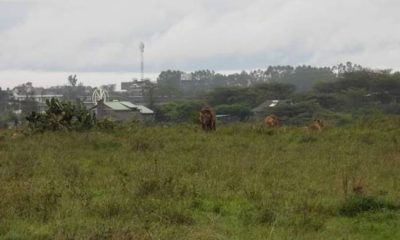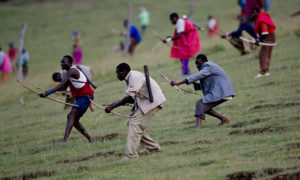Development
What Next After Burning Of The Ivory
Kenya is set to set up ablaze the biggest stockpiles of ivory seized by the authorities. President Kenyatta is expected to lead to burning 105 tonnes o ivory estimated to worth about Sh.8 Billion the street value on the 30th of April at the Nairobi national park. According to conservation lobby groups reports,1,000 elephants were lost to poachers in 2014 alone and that every 15 minutes an elephant is killed globally. Last year, estimated 100 elephants died in Kenya and Africa about 33,000 elephants are killed every year.
Records from 1975, had put elephants population I n Kenya at 160,000 but the number has tragically reduced to 35,000 as of 2015 records. Africa at large has seen a 60 percent drop in elephant population over the last decade pressing all the alarm buttons. Kenya, which relies on tourism as its revenue background and wildlife including elephants making up to 70 per cent of the attraction, has all the reasons to be alarmed by the drastic decline of animals facing possible distinction thanks to the escalating poaching. Tourism generates an average annual revenue of Sh.300 billion to Kenya.
Coincidentally, President Uhuru won’t be the first president to put up the ivory up on fire as all his predecessors have done the same making the exercise look like more of a custom. In 1989, President Daniel Moi set on fire the first 12-tonne of ivory stockpile with a Sh.1.2bn street value, in 2009, President Mwai Kibaki set the second batch of 335 tusks on fire weighing about 5 tonnes. President Uhuru initially in 2015 had burned about 15 tonnes of the ivory. This year is the biggest stockpile in history ever to go up in flames.
Expectedly, many opponents of the burning strategy have come argued that the government would adopt other methods like selling off the cache and using returns to fund conservation instead of burning and putting everything into ‘waste’. However the president in his statement and in line with this year’s theme of worth more alive stamps that ivory is an illegal commodity and that the government can’t engage in illicit trade in the name of disposing of the tusks.
Burning of the tusks according to the Kenya Wildlife is meant to send a message to the poachers that the elephants are more worthy than their tusks and also to cut supply to the market by eliminating biggest pile in history from the market link. Question many should, therefore, ask themselves is what happens next after the stockpile is reduced to ashes and possibly cut off the customary burning year in and out.
Several interventions that should be correctly emphasised on includes
Harsh anti-poaching laws and antagonistic enforcement
Crime will thrive mostly where laws are loose and implementation is not the up-to task. International, ivory trade has been announced illegal but despite this universal declaration, the trade continues to thrive putting into blast the sissy law enforcements especially in Kenya.
Fatefully, Kenya has the toughest anti-poaching legislations that poaching now attracts a Sh.20Million penalty or life incarceration. Despite the stringent legislation, poachers and dealers continue to manoeuvre with the illegal trade. Several investigative reports including the 2013’s of KTN’s Denis Onsarigo,revealed how poachers are known but the larger racket enjoying state protection.
To break these links, honest investigations must be taken up upon and that those convoluted brought to book for the system to be seen as genuine in combating poaching. Failure to attack the matter at its roots will give the proponents a field day with the script that burning of ivory is a mere PR stunt while the real concerns are being swept under feet.
Effective control over movement of ivory
Evidently, Ivory doesn’t have wings that they can fly themselves out of the country to the market destination countries. These tusks are moved and sail through the borders under full authority watch. If we can seal all the loopholes, we can restrict the movement, put up a block around. Scrutinise the freight companies which are said to be proxies used in pushing the tusks out of the country.
Authority officers clearing containers without or knowingly the containers having ivory must be severely punished. This intervention will cut off a movement of the commodity. Cargo verifications were important to stop illegal product flow.
Collaboration with local communities and civic education
It has been found much of the poaching is often done by the locals surrounding the parks or at least they help a lot the poachers to perform their criminal acts, killing and making away with the tusks. Dealers are known to pay the poachers a small amount of money after the kill. Civic education to these community members on the benefits they stand getting on keeping the elephants alive than from the tusks will go a long way in eradicating the menace.
Most of the locals engage in the illegal trade out of ignorance not knowing they stand to get more benefits from tourism remits if the elephants and wildlife are kept alive than when they are killed and tusks sold. Instilling this important vector will give locals sense of ownership and urge to protect the wildlife. This intervention luckily has been in place in some communities and has seen some poachers rehabilitated and now working along game rangers to combat poachers.
If we failed to implicate the proposed and end things with burning ivory, we would have failed. The wildlife, Kenya’s heritage is facing extinction a big blow that would be to our economic health. The sustainable strategy must be put in implemented to ensure the security of animals. Use latest surveillance technologies on animals and weapons to fight off poachers and above all bring to books the known poaching cartel into books.
Kenya Insights allows guest blogging, if you want to be published on Kenya’s most authoritative and accurate blog, have an expose, news TIPS, story angles, human interest stories, drop us an email on [email protected] or via Telegram
-

 Grapevine2 weeks ago
Grapevine2 weeks agoRussian Man’s Secret Sex Recordings Ignite Fury as Questions Mount Over Consent and Easy Pick-Ups in Nairobi
-

 News1 week ago
News1 week agoTHE FIRM IN THE DOCK: How Kaplan and Stratton Became the Most Scrutinised Law Firm in Kenya
-

 Investigations2 weeks ago
Investigations2 weeks agoMulti-Million Dollar Fraud: Three Kenyans Face US Extradition in Massive Cybercrime Conspiracy
-

 Economy1 week ago
Economy1 week agoIran Demands Arrest, Prosecution Of Kenya’s Cup of Joe Director Director Over Sh2.6 Billion Tea Fraud
-

 Business1 week ago
Business1 week agoA Farm in Kenya’s Rift Valley Ignites a National Reckoning With Israeli Investment
-

 Africa2 weeks ago
Africa2 weeks agoFBI Investigates Congresswoman Ilhan Omar’s Husband’s Sh3.8 Billion Businesses in Kenya, Somalia and Dubai
-

 Grapevine6 days ago
Grapevine6 days agoA UN Director Based in Nairobi Was Deep in an Intimate Friendship With Epstein — He Even Sent Her a Sex Toy
-

 News2 weeks ago
News2 weeks agoTragedy As City Hall Hands Corrupt Ghanaian Firm Multimillion Garbage Collection Tender





























